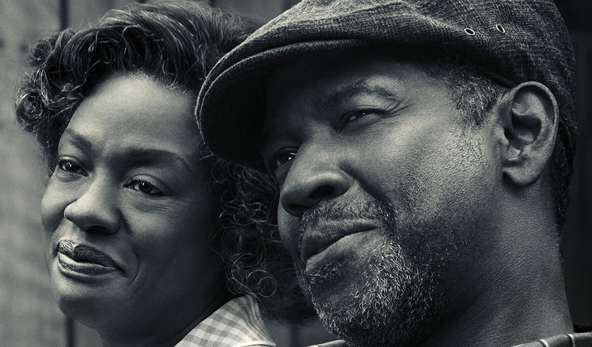That old platitude that’s supposed to help everyone about to lose the person they love, “If you love someone set them free,” doesn’t apply to playwright August Wilson’s screen adaptation of Fences. Revived six years ago for the stage, both Denzel Washington and Viola Davis acted in the lead roles of Troy and Rose Maxson, a married couple of eighteen years living in 1950s Pittsburgh.
As a garbage man, Troy finds little satisfaction in his day to day other than conversing with his longtime friend, Jim Bono (Stephen McKinley Henderson), who has known him all the way back since the days when he was imprisoned for robbery. The revelation that Troy served a fifteen-year sentence during which time Rose faithfully waited for him to get out while raising their firstborn son, Lyons (Russell Hornsby), is just one of many indications of how loyal and loving she is toward Troy.
And yet, a woman seen too often by the man who initially loves her in that Romeo-infused ardor sort of way soon becomes day old bread. Especially when she’s overly catering and attentive. Even so, in the face of Troy’s blatant drinking problem (though he insists it’s fine since he only ties one on once a week–Fridays) and stifling of their son Cory’s (Jovan Adepo) athletic talent, Rose remains his most devoted advocate.
The occasional and random appearance of Troy’s brother, Gabriel (Mykelti Williamson), whose injury in the war left him mentally unhinged, with a metal plate in his head and with $3,000 from the government for his troubles, weighs heavily on Troy–latently guilt-ridden for taking advantage of Gabriel’s financial gain for his own benefit.
All the while–and at the behest of Rose–Troy and Cory work on building a fence that never comes to fruition, instead bringing out the constant sources of contention between father and son. This chiefly pertains to Cory’s discontent over Troy not “liking” him and his belief that Troy’s disdain for him merely comes from his own feelings of inadequacy, of knowing that his son will surpass him in life.
Bono, who has known Troy long enough to sniff out any of his irregular behavior, calls him out on a dalliance he’s been having with a woman named Alberta. He cautions Troy, “Some people build fences to keep people out, and other people build fences to keep people in.” This, naturally, refers to Rose, who beneath the surface of it all, knows somewhere inside that Troy is trying to pull away from her in spite of all her diligence.
As the family dynamic continues to fray, Wilson’s screenplay delves deeply into the adversarial rapport between not just fathers and sons, but parents and children in general. The symbol of the fence also relates to the way parents try to box their children in, keep them under their thumb for as long as they can without realizing that it’s only stifling their growth. Wilson, who managed to finish adapting the script before his death in 2005, was prudent in waiting to allow his work to be produced, insisting that a black director helm the project. And, seeing it now, it only makes sense that Washington would both star and direct it. His own salt of the earth, self-sacrificing parents (his father was a minister, his mother the owner of a beauty parlor) seem adequate inspiration from which to draw on in embodying the role of “parent.”
Beyond the strata of of oppression between loin and fruit of loin is still the romantic slight so often experienced by most women who have given all of themselves to their man. Rose’s handling of a certain revelation beyond just Troy’s affair is what forces her to, as they say, “set him free.” And it’s only when she does this that he tries to come back to her. So maybe there is something to that goddamn trite aphorism.






















